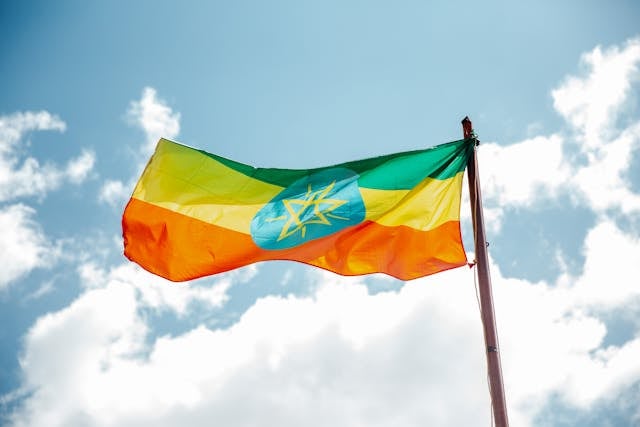What Is Amharic? A Quick Guide to Ethiopia’s Official Language
Ever wondered what language is spoken in Ethiopia? It’s called Amharic—and it’s unlike anything you’ve heard before. With its own beautiful script, melodic greetings, and centuries of history, Amharic is a must-know for travelers and language lovers alike.
In this quick guide, we’ll walk you through the most frequently asked questions about Amharic, including how to say basic phrases, how the writing system works, and where you can take personalized Amharic lessons.
→Sign Up Now: Free Trial Amharic Lesson With a Native Teacher!←
What is Amharic?
Amharic is the official language of Ethiopia.
It belongs to the Semitic branch of the Afroasiatic language family and is one of the few African languages with its own unique script. It is used by over 30 million native speakers and serves as a lingua franca in much of the country. Amharic has a long literary history and is the language of government, education, and the Ethiopian Orthodox Church.
What country speaks Amharic?
Amharic is spoken in Ethiopia.
It is the most widely used language in Ethiopia and functions as the country’s official working language. While several regional languages are spoken across Ethiopia, Amharic plays a central role in national communication and administration. It is also spoken by Ethiopian communities around the world, particularly in the United States, Israel, and Canada.
What is the Amharic language?
The Amharic language is a Semitic language spoken mainly in Ethiopia.
It evolved from Geʽez, an ancient liturgical language still used in religious contexts, and features a complex verb system, root-based word formation, and gendered forms for nouns and pronouns. Amharic uses a unique syllabic script and incorporates vocabulary from other Ethiopian languages, Arabic, and Italian due to historical influences.

How do you say “How are you?” in Amharic?
To say “How are you?” in Amharic, use “Dehna neh?” for a man and “Dehna nesh?” for a woman.
These are standard informal greetings. For more formal situations or groups, you would say “Dehna nachu?” (plural/formal). The word “dehna” means “well” or “good,” and these phrases are used widely in both casual and respectful interactions. A common response is “Dehna negn” (I’m fine).
What are the Amharic letters?
Amharic uses a unique writing system with 33 base characters, each with seven forms.
The script, known as Fidel, is derived from the ancient Geʽez alphabet and is syllabic. Each character represents a consonant-vowel combination, resulting in over 200 symbols in total. For example, the character ሀ (ha) changes form to ሁ (hu), ሂ (hi), ሃ (ha), and so on depending on the vowel sound. The script is written from left to right and is used in everything from road signs to literature.
What are common greetings in Amharic?
Common greetings in Amharic include:
– Selam – Hello
– Dehna neh/nesh? – How are you? (male/female)
– Dehna hun – Be well (used as a farewell)
– Tenayistilign – Peace be upon you (formal greeting)
– Indemin walachu? – How are you all?
Greeting someone properly is very important in Ethiopian culture and usually includes asking about the person’s well-being and that of their family.
What are useful survival phrases in Amharic?
Useful survival phrases in Amharic include:
– Selam – Hello
– Ameseginalehu – Thank you
– Yiqirta – Sorry
– Ishi – Okay / Alright
– Betam amesegenallo – Thank you very much
– Min yiblachu? – What did you say?
– Aydelem – No / That’s not correct
– Enkuan des yilish – Nice to meet you (to a woman)
– Sint new? – How much is it?
These Amharic phrases help travelers manage everyday situations like greeting locals, asking questions, showing appreciation, or navigating markets and transportation. They are especially useful in Addis Ababa and other urban areas where English is less commonly spoken.
Is Amharic difficult to learn?
Amharic is considered a difficult language for English speakers, according to the U.S. Foreign Service Institute (FSI).
Amharic is classified as a Category IV language, meaning it typically takes around 1,100 classroom hours to reach professional working proficiency. The main challenges include its unique Geʽez script, unfamiliar pronunciation patterns, and complex verb forms. That said, full fluency isn’t necessary for travelers or tourists. With focused practice, most learners pick up essential greetings, survival phrases, and basic questions in just a few weeks—enough to navigate local markets, taxis, and social encounters with confidence.
Where can I learn Amharic?
You can learn Amharic through online or face-to-face courses with Language Trainers.
We offer personalized Amharic lessons with native-speaking teachers who adapt the content and pace to your learning goals. Whether you’re preparing for a trip, reconnecting with family roots, or starting from scratch, our tutors will help you build practical skills using real-life materials and conversation-based instruction. Amharic Lessons are available in-person in most major cities or remotely from anywhere in the world.
Contact Language Trainers today and we’ll match you with the ideal teacher based on your availability, language level, and personal objectives.
